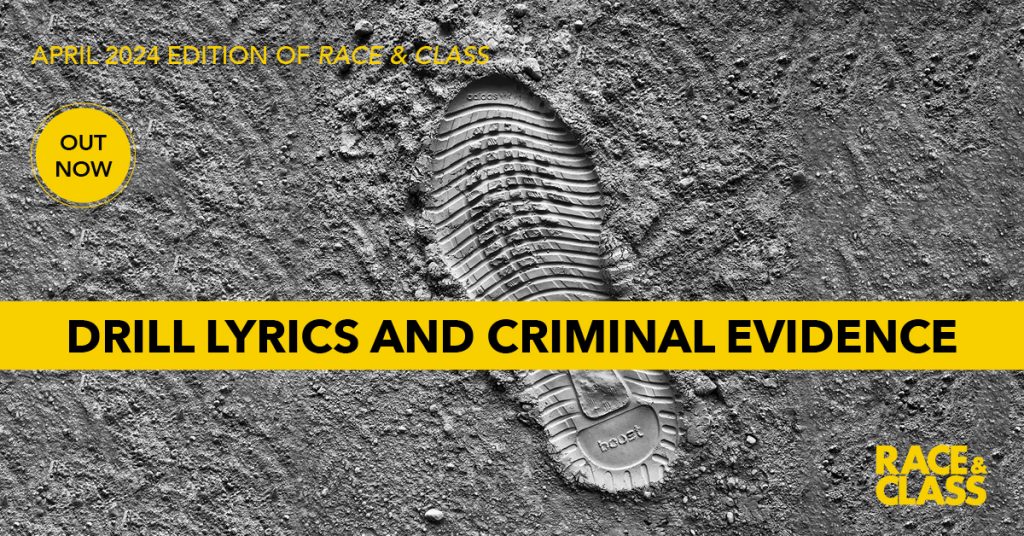Racism seeps into every aspect of criminal ‘justice’ and radical scholars are exposing the breadth and depth of the issue. The April 2024 issue of Race & Class contains cutting-edge articles on the criminal legal system, adding to a growing number of campaigns voices rejecting the normalisation of systemic injustice in the courts.
Drill rap lyrics are used regularly by police and prosecutors as plausible evidence against young Black working-class defendants in UK criminal cases. In ‘Racist inferences and flawed data: drill rap lyrics as criminal evidence in group prosecutions’, Eithne Quinn, professor of Cultural Studies at the University of Manchester, examines state interpretations of drill lyrics in the preparation of serious crime cases, focusing on a 2020 joint enterprise murder case in London. By forensically unpacking the way the state uses violent rap lyrics to build secondary liability in group prosecutions, she shows how drill lyrics are quoted to invoke popular stereotypes and even mislead the court.
Also providing much-needed scrutiny of the courts, Nisha Waller, Racial Justice researcher at APPEAL and Naima Sakande combine a legal analysis of the jury system with archival research of the UK’s anti-racist history to shed light on the decision to introduce majority verdicts, as opposed to unanimous ones, in 1967. ‘Majority jury verdicts in England and Wales: vestige of white supremacy?’ lays bare for the first time how racist anxieties around the presence of commonwealth immigrants in post-war Britain combined with fears of Black Power fed into the decision to introduce majority verdicts and so retain the mythical high calibre of justice in England and Wales.
Taking readers to the US context and its ongoing legacies of settler colonialism, Falguni Sheth, Professor of Women’s and Gender and Sexuality Studies at Emory University, contributes a legal philosophical perspective in her article on ‘Dismissal, legibility and the normalising of colonial misrecognition’. Building on court cases involving Muslim women, she explores the judicial act of dismissal in discrimination cases, whereby an authority judges a speaker’s grievances as implausible or unworthy of consideration, thus exposing a long history of the epistemic silencing of women of colour in the courts.
Articles:
- Racist inferences and flawed data: drill rap lyrics as criminal evidence by Eithne Quinn
- Majority jury verdicts in England and Wales: a vestige of white supremacy? by Nisha Waller and Naima Sakande
- Dismissal, legibility and the normalising of colonial misrecognition by Falguni Sheth
- Life next to a landfill: urban marginality, environmental injustice and the Roma by Daniel Škobla and Richard Filčák
- Is multi-polarity the new non-alignment? by Jerry Harris
Reviews
- Friends of Israel: the backlash against Palestine solidarity by Hil Aked (C. Heike Schotten)
- Our History Has Always Been Contraband: In Defense of Black Studies edited by Colin Kaepernick, Robin D. G. Kelley and Keeanga-Yamahtta Taylor (Jasbinder S. Nijjar)
- Making the Revolution Global: Black radicalism and the British socialist movement before decolonisation by Theo Williams (Colin Prescod)
- Prophet against Slavery: Benjamin Lay, a graphic novel by David Lester, illustrated by David Lester, edited by Paul Buhle and Marcus Rediker (Ry O. Siggelkow)
- Systems of Suffering: dispersal and the denial of asylum by Jonathan Darling (Frances Webber)

